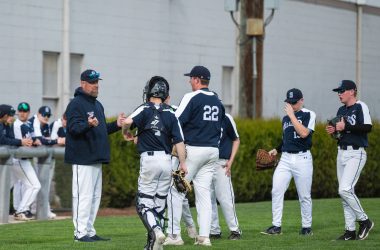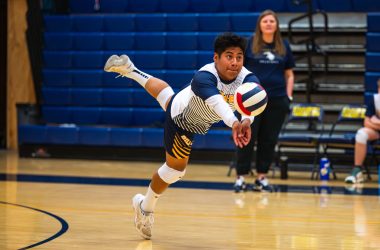 CMS principal Shirley Burrus receives the 191st Portable Automated External Defibrillator. With Burrus are Jeff and Bev Heller, parents of the late David Heller, for whom the foundation is named. PHOTO PROVIDED/CHARLES MUEHLECK
CMS principal Shirley Burrus receives the 191st Portable Automated External Defibrillator. With Burrus are Jeff and Bev Heller, parents of the late David Heller, for whom the foundation is named. PHOTO PROVIDED/CHARLES MUEHLECK
CRESWELL – No one wants to think about the possibility of sitting in the stands, watching their son, daughter or grandchild participate in school football or basketball game, and seeing their child or a teammate go into sudden cardiac arrest from a previously undetected heart condition.
But it happens. Soberingly, sudden cardiac arrest (SCA) is the leading cause of death in young athletes. One such sudden cardiac death (SCD) occurs every three days in the U.S. – most during training or a competition. Most victims are male, and more than two-thirds of these sudden cardiac deaths occur among basketball and football players.
SCA is an opponent Creswell Middle School is improving its athletes’ odds of defeating, thanks to a new Portable AED (Automated External Defibrillator) presented to Principal Shirley Burrus during the David Heller Foundation’s 2019 The Beat Goes On benefit auction, held Sept. 28 at the Red Lion on the River – Jantzen Beach.
It’s the 191st Portable AED that the foundation has given to schools over the past five years, in honor of David Heller of Scappoose, Oregon, who was just 17 when he died on Nov. 23, 2005, as a result of an undiagnosed heart condition called Hypertrophic Cardiomyopathy (the leading cause of SCD).
He was at the time a junior at Central Catholic High School in Portland, where he was the basketball team’s starting shooting guard. He had participated in a basketball scrimmage, followed by other routine activities, that day, then went to sleep and did not wake up. He displayed no symptoms that might have alerted his parents, Jeff and Bev Heller – who were present at the benefit auction – that he had a life-threatening medical condition.
After David’s death, the David Heller Foundation was established to help other youth and to honor David’s life by providing student-athletes and coaches with the equipment needed in the event of sudden cardiac arrest.
The potentially lifesaving new Portable AED will accompany CMS sports teams on all away games, Burrus said, and made its inaugural trip with the eighth-grade volleyball team when they traveled to Pleasant Hill on Oct. 4.
”This truly was a wonderful gift; it could save the life of a student, coach or spectator in the event of sudden cardiac arrest,” said Burrus. ”That’s how and why the benefit auction is titled ‘The Beat Goes On.’”
Burrus and Jeff Heller graduated together from St. Helens High School in 1975 and have remained good friends. The Hellers invited Burrus to attend the auction, saying they wished to present her with a Portable AED for CMS student-athletes – or anyone who might need it while attending a school event.
”I believe that CMS received the AED from the Foundation because of the friendship I have with David’s father, and him wanting to give our school a special gift,” said Burrus, who began her career in education as a health and physical education teacher. ”He knows of my continued commitment to the health and safety of our students and the love I have for athletics.”
As of Jan. 1, 2015, all Oregon school campuses have been required (under ORS 339.345, adopted during the 2010 Special Session of the Oregon Legislature) to have at least one AED on the premises – and the Portable AED presented during the benefit will actually be the third AED at CMS, which has one in its school office near the health room and one in the gym, Burrus said.
The new Portable AED will be available to travel with sports teams on road trips, while allowing CMS to continue meeting the mandate that at least one AED be located on campus at all times.
”We do have an AED located in our gym for home games,” Burrus confirmed, noting that the other two AEDs on campus are not truly transportable.
In 2005, the Oregon Legislature passed Oregon Revised Statutes (ORS) 327.364, which authorized the Oregon Department of Education to seek funds and assistance from the United States government and its agencies or from any other source, public or private, for the establishment of a grant program to provide these AEDs within school districts – and the David Heller Foundation has become one of these granting sources.
This law also contains a Good Samaritan clause which protects well-intentioned citizens using an AED in aid of another from potential lawsuits from any resulting injury.
At each school, at least some staff members – those who can be expected to be onsite during regular school hours and/or at school activities – must be trained in the safe use of this medical equipment; training is typically available through the American Red Cross, the American Heart Association, and local EMS providers.
”I do believe every (Creswell) school has at least one AED, and we have been trained by (CMS PE/health teacher) Lauri Thomas, who provides our First Aid/CPR certification through the American Red Cross,” Burrus said. The cost of a fully- or semi-automated AED ranges from about $1,000 to nearly $4,000; Burrus said their new Portable AED costs about $1,250.
”The devices are expensive, but so worth it if a life can be saved,” she said.







